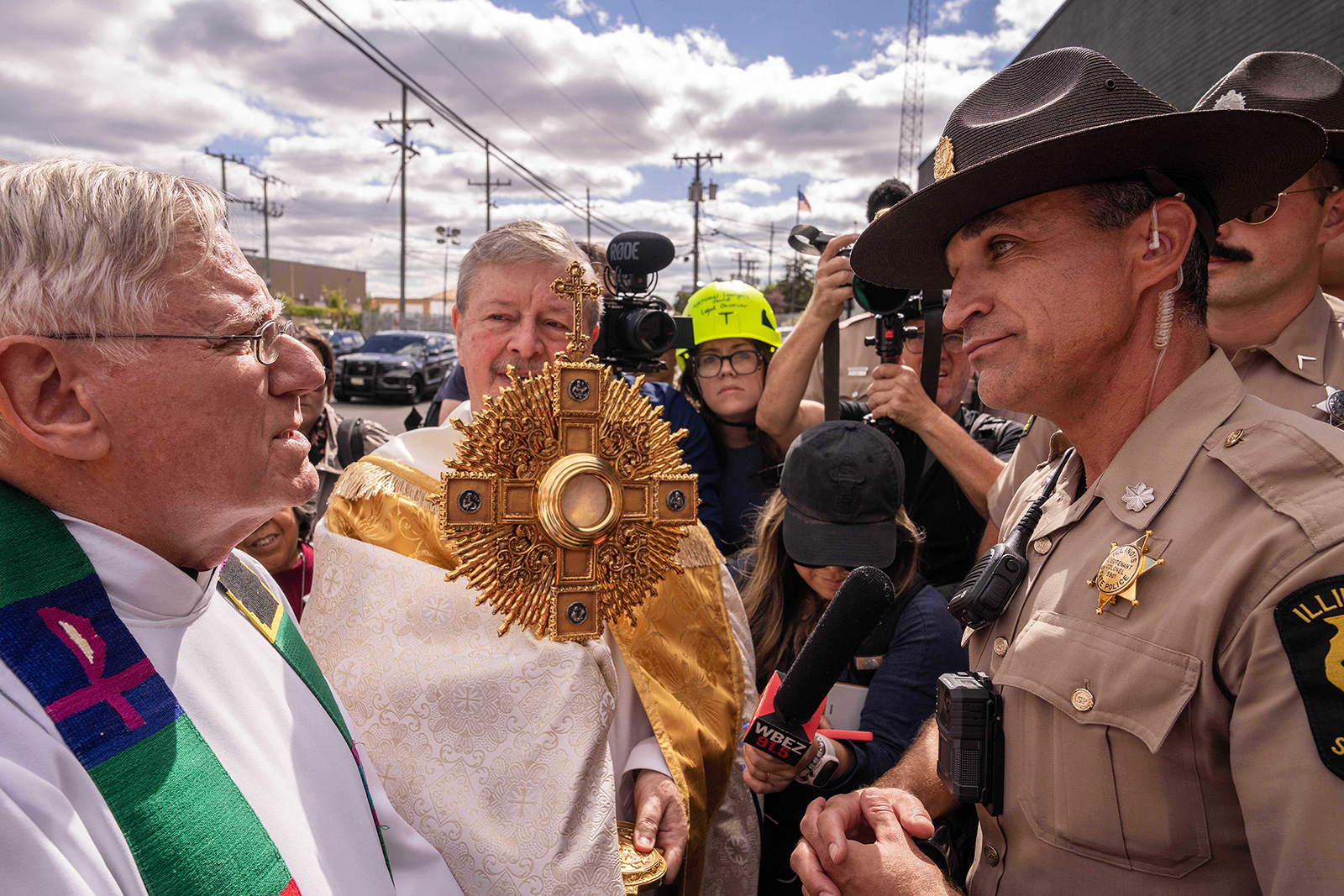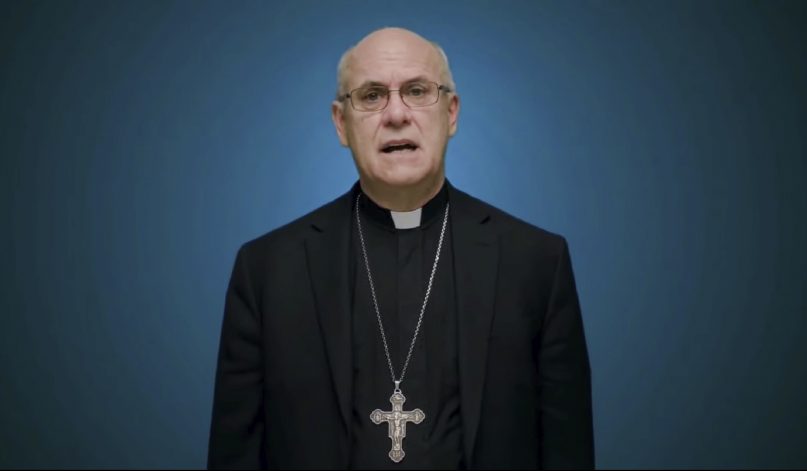
(RNS) — Two Catholic bishops who sit on or advise President Donald Trump’s Religious Liberty Commission are voicing criticism of the administration, arguing immigrants detained by U.S. Immigration and Customs Enforcement should have access to religious services such as Communion.
“It is important that our Catholic detainees are able to receive pastoral care and have access to the sacraments,” Bishop Kevin Rhoades, who oversees the Fort Wayne-South Bend Diocese in Indiana, told Religion News Service in an email on Monday (Nov. 3). “Their religious liberty, part of their human dignity, needs to be respected.”
The comments from Rhoades, who serves as an adviser to the president’s Religious Liberty Commission, were in response to an RNS inquiry about a pair of religious freedom concerns emerging at an ICE detention center in Broadview, Illinois. Last week, attorneys filed a class-action lawsuit alleging widespread mistreatment of detainees at the facility, such as denial of their religious rights, citing testimony from faith leaders who have “provided religious services at Broadview for years but are now denied the ability to provide pastoral care under Defendants’ command.” At least three public efforts to offer Communion to detainees have been denied by the U.S. Department of Homeland Security in recent weeks, including two Catholic-led efforts, one of which occurred this past Saturday and featured participation from Chicago Auxiliary Bishop José María Garcia-Maldonado.
The lawsuit cites testimony from Sister JoAnn Persch, a Sisters of Mercy nun. She told RNS in an email this week that she used to be able to go into the facility to “meet those being deported” and even was able to ride on the bus with detainees as they were brought to the airport — but that her relationship with ICE is now strained.

Bishop Robert Barron. (Photo courtesy of Word on Fire)
Rhoades’ comments came only a few minutes after Bishop Robert Barron, who oversees the Diocese of Winona-Rochester and sits on the president’s Religious Liberty Commission, published a post on X regarding the issue. Barron said he has been “in touch with senior officials in both the State Department and the Department of Homeland Security and have brought forward the concerns of the Church regarding detainees’ access to Sacraments.”
Barron added: “I feel that maintaining open lines of communication and engaging in dialogue with the Administration constitute the most constructive way forward.”
The bishop was part of the White House event marking the creation of the president’s Religious Liberty Commission, which has aligned with Trump’s stated goal of combating “anti-Christian bias.”
The statements of the prelates come weeks after Pope Leo XIV publicly criticized Trump’s immigration policies, denouncing the “inhuman treatment of immigrants in the United States” and urging U.S. bishops to speak out more in support of immigrants.
Both bishops are also candidates for president of the U.S. Conference of Catholic Bishops, which is slated to meet and vote later this month.
DHS, which oversees ICE, did not respond to a request for comment on the bishops’ remarks.
Barron and Rhoades were also asked about the treatment of clergy who have demonstrated outside the Broadview facility in recent weeks. Footage of the Rev. David Black, a Presbyterian minister, being shot in the head with pepper bullets while praying outside the Broadview facility was widely shared on social media last month, and at least four other clergy have reported being similarly hit with pepper balls or rubber bullets while demonstrating at the facility.
Barron did not address the concerns of the clergy, although Rhoades noted that he hoped all of the issues RNS asked about would be brought up at future meetings of the Religious Liberty Commission. Rhoades added that the commission is currently not meeting, as appropriations that fund it have lapsed.

In this photo taken from video, Bishop Kevin Rhoades of Fort Wayne-South Bend, Ind., speaks on June 17, 2021. (United States Conference of Catholic Bishops via AP)
A lawsuit filed last month included Black and other clergy as plaintiffs, alleging DHS is violating their religious freedom. The judge in the case has handed down a temporary restraining order barring DHS agents from taking certain violent actions against “religious practitioners” and others and referenced the treatment of Black in her order as well as the inability for the Catholic-led vigil that has been convened outside the facility for nearly 20 years.
“Now, of course, we can’t even pray in front of the building,” Persch, who has long participated in the vigil at Broadview, said in her email. “Our group has to pray at a distance.”
Meanwhile, religious pushback to ICE’s actions in Chicago continues to grow. At least one pastor, United Methodist minister the Rev. Hannah Kardon, was thrown to the ground and arrested by Illinois State Police last month while protesting outside the facility. In addition, more than 280 Chicago-area clergy have signed on to a letter, titled “Jesus is Being Tear Gassed at Broadview,” pledging to put their “bodies on the line” to advocate for immigrants. At least 61 religious groups, including the leadership of entire Christian and Jewish denominations as well as the U.S. Conference of Catholic Bishops, have signed on to lawsuits against the Trump administration this year, most of which involve challenges to the president’s immigration policies.
In addition, Cardinal Blase Cupich, the Catholic archbishop of Chicago, released a statement last month declaring: “Let me be clear. The Church stands with migrants.”
The efforts add to widespread religious pushback to Trump’s mass deportation efforts that have manifested in different ways across the country. Last month, a United Church of Christ pastor demonstrating against ICE in California was shot directly in the face with a pepper round by a DHS agent standing only a few feet away, leaving the clergyman’s chin bloodied and his face covered in pepper dust. Footage of the moment, like the similar incident involving Black, went viral on social media.
Even so, faith leaders have struggled to garner a response from elected officials. Asked last week about emerging religious liberty concerns regarding the treatment of clergy outside the Broadview ICE facility, House Speaker Mike Johnson, a Southern Baptist, dismissed the concerns of clergy who have protested at Broadview and elsewhere. After insisting he had not seen or heard about clergy being shot with pepper rounds, despite having been asked about one incident weeks before, Johnson argued religious freedom does not entitle clergy to “get in the face” of ICE agents and assault them before adding, “if indeed that was what happened there.”
RNS also reached out to the three other Catholic bishops who are members of Trump’s Religious Liberty Commission or serve as advisers to it — Cardinal Timothy Dolan of the Archdiocese of New York, Archbishop Salvatore Cordileone of the Archdiocese of San Francisco and Bishop Thomas Paprocki of the Diocese of Springfield in Illinois. None responded.
